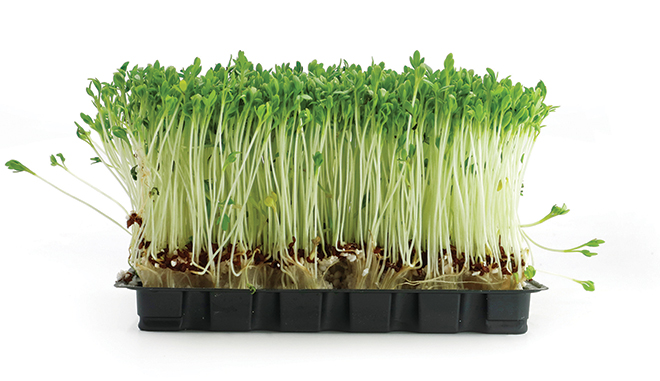
By Colleen Derrico
The term “superfood” is one that is used quite frequently these days. Healthy eating, plant-based diets and juicing trends are on the rise, but many people are still surprised when they hear about the amazing nutritional properties found in sprouts and wheatgrass. Not only are sprouts a great addition to any dish, but they also add large amounts of highly concentrated nutrients to your diet. Although sprouts are phenomenal for you, there is still a stigma leftover from a salmonella outbreak that occurred during the 1990s. This outbreak left a bad name for the sprouting industry and permanently scared many people away from eating one of the healthiest foods on the planet. Here you’ll find some information about the nutritional benefits found in sprouts and wheatgrass—along with how the sprouting industry is working hard to grow the safest sprouts yet.
The most commonly known sprout is alfalfa, but sprouts come in all different shapes, sizes and flavors. They include the mild and crunchy red clover, spicy radish, flavorful onion and the nutrition packed broccoli. All sprouts are a tremendous source of chlorophyll, which acts as a natural blood cleanser and detoxifier. Sprouts are also a great source of protein and are the perfect addition to the diet of vegetarians and vegans. Although sprouts are tiny, they pack a huge nutritional punch. Two ounces of broccoli sprouts contain as much nutrition as two pounds of actual broccoli. Broccoli sprouts also contain high amounts of sulforaphanes, strong antioxidants which can help kill free radicals, assist with the healing from cancer, autoimmune diseases and chronic illness.
Microgreens have also recently become popular among chefs and the general public as a colorful garnish and for their nutritional benefits. What many don’t realize is that microgreens are essentially sprouts that are grown in a medium such as soil, whereas sprouts are grown hydroponically (just in water). While sprouts are a living food that is technically still growing after harvest, microgreens are cut from the root before eating, and therefore, do not have the same “live energy” that a sprout has.
Wheatgrass is another superfood growing in popularity at local juice bars and can be grown hydroponically or in a medium such as soil. Unlike sprouts, wheatgrass can only be juiced, due to the fact that our bodies cannot digest grass the way a cow does. Wheatgrass is considered a “complete food” and contains everything from vitamins and minerals to protein. It contains so much nutrition that a one ounce shot of wheatgrass has the same amount of nutrition as two pounds of leafy green vegetables!
Many health-conscious consumers are aware that even if you eat an all organic diet, we are still exposed to many toxins and harmful chemicals in our everyday environment that are unfortunately beyond our control. Wheatgrass is a great addition to anyone’s diet for this very reason. Not only does wheatgrass contain such a high concentration of vitamins and minerals, but it also contains a high amount of chlorophyll. Chlorophyll cleanses the blood, removes toxins, heavy metals and carcinogens from your system. Ann Wigmore, a pioneer in the holistic industry, cured herself of colon cancer using wheatgrass. She also wrote several books and even started her own holistic health clinic based on her research and personal healing journey.
In the 1970s, sprouts were a popular health food item often grown at home (most commonly in a mason jar). An unfortunate salmonella outbreak in the 1990s caused large numbers of people to become extremely ill. This led to quick action by the FDA, and sprouts were moved to the hazardous food item list. It is understandable why sprouts have remained on this list since then. Sprouts are grown in a warm aqueous environment, the perfect breeding ground for bacteria. So, what are sprout growers doing to ensure a safe product?
The key to any growing operation’s success is high-quality seed. Sprout growers must create guidelines as to how they go about approving seed suppliers and require proof of food safety audits, letters of guarantee and possible organic certificates from their suppliers. With each batch of seed that is delivered the seed supplier must provide proof of seed batch testing. This means each batch of seed has been tested for the germination rate, E. coli 0157:h7 and Salmonella. Some seed suppliers even pre-treat the seed with an approved sanitizing treatment before delivery. If the supplier is not the one treating the seed, then it is the responsibility of the grower to do so.
Approximately 48 hours into the growing process, water samples (referred to as spent irrigation water) are collected for each batch of sprouts being grown. These samples are tested for E. coli 0157:h7 and salmonella. Sprout growers are required to have a hold and release policy to ensure that no sprouts are released for consumption until negative test results have been received. Along with testing of the spent irrigation water, sprout growers are now required to perform regular environmental testing for listeria. This is yet another precaution taken to ensure that the sprouts are grown in a sanitary environment and will not be contaminated by bacteria during the growing process.
For several years, sprout growers have been working hard in conjunction with the FDA to create a safer growing process. Due to the recent lettuce outbreaks, food safety is on the forefront, and it is time for sprout growers to spread this information and educate customers. These latest safety standards, along with the nutritional benefits found in sprouts, should help encourage the public to confidently purchase sprouts for their families. When it comes to superfoods, sprouts and wheatgrass are a simple addition to your diet and can truly make a difference in your health.
Colleen Derricoworks at Chicago Indoor Garden. Like many farmers, Colleen wears many hats and handles everything from the family business’ social media to food safety and organic certification. Chicago Indoor Garden is a small, family-owned and operated urban farm that is proud to be Certified Organic, food safety audited and is also currently working on their Non-GMO Certification. Visit www.chicagoindoorgarden.com, or following them on Facebook or Instagram @chicagoindoorgarden.
 Conscious Community Magazine Dedicated to Elevating Consciousness
Conscious Community Magazine Dedicated to Elevating Consciousness




